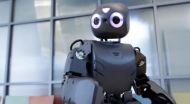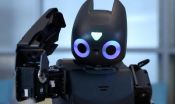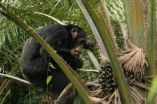(Press-News.org) With the help of a smart tablet and Angry Birds, children can now do something typically reserved for engineers and computer scientists: program a robot to learn new skills. The Georgia Institute of Technology project is designed to serve as a rehabilitation tool and to help kids with disabilities.
The researchers have paired a small humanoid robot with an Android tablet. Kids teach it how to play Angry Birds, dragging their finger on the tablet to whiz the bird across the screen. In the meantime, the robot watches what happens and records "snapshots" in its memory. The machine notices where fingers start and stop, and how the objects on the screen move according to each other, while constantly keeping an eye on the score to check for signs of success.
When it's the robot's turn, it mimics the child's movements and plays the game. If the bird is a dud and doesn't cause any damage, the robot shakes its head in disappointment. If the building topples and points increase, the eyes light up and the machine celebrates with a happy sound and dance.
"The robot is able to learn by watching because it knows how interaction with a tablet app is supposed to work," said Georgia Tech's Ayanna Howard, Motorola Foundation Professor in the School of Electrical and Computer Engineering who is leading the project. "It recognizes that a person touched here and ended there, then deciphers the information that is important and relevant to its progress."
The robot analyzes the new information and provides appropriate social responses while changing its play strategy.
"One way to get robots more quickly into society is to design them to be flexible for end users," said Hae Won Park, Howard's postdoctoral fellow working closely on the project. "If a robot is only trained to perform a specific set of tasks and not able to learn and adapt to its owner or surroundings, its usefulness can become extremely limited."
That flexibility is one reason Howard and Park see their robot-smart tablet system as a future rehabilitation tool for children with cognitive and motor-skill disabilities. A clinician could program the robot to cater to a child's needs, such as turn taking or hand-eye coordination tasks, and then send the machine home.
Another benefit for rehab: parents don't always have time or enough patience for repetitive rehabilitation sessions. But a robot never gets tired or bored.
"Imagine that a child's rehab requires a hundred arm movements to improve precise hand-coordination movements," said Howard. "He or she must touch and swipe the tablet repeatedly, something that can be boring and monotonous after a while. But if a robotic friend needs help with the game, the child is more likely to take the time to teach it, even if it requires repeating the same instructions over and over again. The person's desire to help their 'friend' can turn a five-minute, bland exercise into a 30-minute session they enjoy."
In a new study, Howard and Park asked grade-school children to play Angry Birds with an adult watching nearby. Afterwards, the kids were asked to teach a robot how to play the game. The children spent an average of nine minutes with the game as the adult watched. They played nearly three times as long (26.5 minutes) with the robot. They also interacted considerably more with the robot than the person. Only 7 percent of their session with the adult included eye contact, gestures and talking. It was nearly 40 percent with the robot.
The next steps for the Georgia Tech team will include more games for the robot, including Candy Crush and ZyroSky. They will also recruit more children diagnosed with Autism Spectrum Disorder (ASD) and children with motor impairments to interact with the system. Their most recent study included two kids with ASD. Their interaction times with the adult were significantly less than those in the typically developing group. They were about the same with the robot. The findings were presented in June at the Rehabilitation Engineering and Assistive Technology Society of North America (RESNA) 2014 Annual Conference in Denver.
INFORMATION:
This research was partially supported by the National Science Foundation (NSF) under grant 1208287. Any conclusions expressed are those of the principal investigator and may not necessarily represent the official views of the NSF.
Your next Angry Birds opponent could be a robot
Georgia Tech team pairs humanoid with popular game to help kids with rehabilitation
2014-07-10
ELSE PRESS RELEASES FROM THIS DATE:
It's Your Game ... Keep It Real reduces dating violence among minority youth
2014-07-10
HOUSTON – (July 10, 2014) – New research from The University of Texas Health Science Center at Houston (UTHealth) shows that It's Your Game…Keep it Real (IYG), a health education program designed to delay sexual behavior and promote healthy dating relationships, can significantly reduce dating violence behaviors among minority youth.
According to the Centers for Disease Control and Prevention, 10 percent of high school youth are victims of physical dating violence and other studies suggest that more than 20 percent are victims of emotional dating violence. Previous studies ...
NOAA, partners predict significant harmful algal bloom in western Lake Erie this summer
2014-07-10
NOAA and its research partners predict that western Lake Erie will have a significant bloom of cyanobacteria, a toxic blue-green algae, during the 2014 bloom season in late summer. However, the predicted bloom is expected to be smaller than last year's intense bloom, and considerably less than the record-setting 2011 bloom.
Bloom impacts will vary across the lake's western basin and are classified by an estimate of both its concentration and how far it spreads.
Harmful algal blooms (HABs) were common in western Lake Erie between the 1960s and 1980s. After a lapse of ...
CNIO scientists develop technology to redirect proteins towards specific areas of the genome
2014-07-10
The Spanish National Cancer Research Centre (CNIO) Macromolecular Crystallography Group has managed to reprogramme the binding of a protein called BuD to DNA in order to redirect it towards specific DNA regions. Guillermo Montoya, the researcher who led the study, says the discovery: "will allow us to modify and edit the instructions contained in the genome to treat genetic diseases or to develop genetically-modified organisms." The study is published in the journal Acta Crystallographica, Section D: Biological Crystallography.
The possibility of making à la carte modifications ...
New technology reveals insights into mechanisms underlying amyloid diseases
2014-07-10
Amsterdam, NL, 10 July 2014 – Amyloid diseases, such as Alzheimer's disease, type 2 diabetes, cataracts, and the spongiform encephalopathies, all share the common trait that proteins aggregate into long fibers which then form plaques. Yet in vitro studies have found that neither the amylin monomer precursors nor the plaques themselves are very toxic. New evidence using two-dimensional infrared (2D IR) spectroscopy has revealed an intermediate structure during the amylin aggregation pathway that may explain toxicity, opening a window for possible interventions, according ...
What you eat may affect your body's internal biological clock
2014-07-10
Food not only nourishes the body but also affects its internal biological clock, which regulates the daily rhythm of many aspects of human behavior and biology. Researchers reporting in the Cell Press journal Cell Reports provide new insights into how adjusting the clock through dietary manipulation may help patients with various conditions and show that insulin may be involved in resetting the clock.
An internal biological or 'circadian' clock plays an important role in preferred sleep times, times of peak alertness, and the timing of certain physiological processes. ...
Mediterranean fish stocks show steady decline
2014-07-10
While careful management has helped stabilize or even improve the state of fisheries resources in some parts of Europe, the situation in the Mediterranean has deteriorated over the past 20 years. In a new report evaluating nine fish species reported in the Cell Press journal Current Biology on July 10, scientists call for stringent monitoring of Mediterranean fishing activities, better enforcement of fisheries regulations, and advanced management plans in Mediterranean waters.
Their data show that the fishing pressure in the Mediterranean intensified continuously from ...
Chimpanzee intelligence depends on genes
2014-07-10
Some chimpanzees are smarter than others, and about half of that variation in intelligence depends on the genes that individuals carry and pass on from one generation to the next. The findings reported in the Cell Press journal Current Biology on July 10 show that those genetic differences will be key to understanding the cognitive abilities of primates and their evolution over time.
"As is the case in humans, genes matter when it comes to cognitive abilities in chimpanzees," says William Hopkins of the Yerkes National Primate Research Center. "It doesn't mean that they ...
Hunger for vegetable oil means trouble for Africa's great apes
2014-07-10
The vegetable oil found in your popcorn or soap might not be ape friendly, and the situation appears likely to get even worse, according to an analysis in the Cell Press journal Current Biology on July 10.
The growing demand for vegetable oil has already led to the conversion of Southeast Asian forest into oil palm plantations, bringing trouble for orangutans in particular. If guidelines are not put in place very soon, researchers say the spread of those large-scale industrial plantations from Asia into Africa will be bad news for great apes there as well.
"The first ...
New compound treats both blindness and diabetes in animal studies
2014-07-10
In a new study led by UC San Francisco (UCSF) scientists, a chemical compound designed to precisely target part of a crucial cellular quality-control network provided significant protection, in rats and mice, against degenerative forms of blindness and diabetes.
In addition to opening a promising drug-development path for the wide range of diseases caused by cell loss, the new research offers a new view of the workings of the unfolded protein response (UPR), a cellular "life-or-death" signaling network: When cells are under stress, the UPR works to ensure that they produce ...
Chimpanzee intelligence determined by genes
2014-07-10
ATLANTA–A chimpanzee's intelligence is largely determined by its genes, while environmental factors may be less important than scientists previously thought, according to a Georgia State University research study.
The study found that some, but not all, cognitive, or mental, abilities, in chimpanzees depend significantly on the genes they inherit. The findings are reported in the latest issue of Current Biology.
"Intelligence runs in families," said Dr. William Hopkins, professor in the Center for Behavioral Neuroscience at Georgia State and research scientist in the ...
LAST 30 PRESS RELEASES:
A promising potential therapeutic strategy for Rett syndrome
How time changes impact public sentiment in the U.S.
Analysis of charred food in pot reveals that prehistoric Europeans had surprisingly complex cuisines
As a whole, LGB+ workers in the NHS do not experience pay gaps compared to their heterosexual colleagues
How cocaine rewires the brain to drive relapse
Mosquito monitoring through sound - implications for AI species recognition
UCLA researchers engineer CAR-T cells to target hard-to-treat solid tumors
New study reveals asynchronous land–ocean responses to ancient ocean anoxia
Ctenophore research points to earlier origins of brain-like structures
Tibet ASγ experiment sheds new light on cosmic rays acceleration and propagation in Milky Way
AI-based liquid biopsy may detect liver fibrosis, cirrhosis and chronic disease signals
Hope for Rett syndrome: New research may unlock treatment pathway for rare disorder with no cure
How some skills become second nature
SFU study sheds light on clotting risks for female astronauts
UC Irvine chemists shed light on how age-related cataracts may begin
Machine learning reveals Raman signatures of liquid-like ion conduction in solid electrolytes
Children’s Hospital of Philadelphia researchers emphasize benefits and risks of generative AI at different stages of childhood development
Why conversation is more like a dance than an exchange of words
With Evo 2, AI can model and design the genetic code for all domains of life
Discovery of why only some early tumors survive could help catch and treat cancer at very earliest stages
Study reveals how gut bacteria and diet can reprogram fat to burn more energy
Mayo Clinic researchers link Parkinson's-related protein to faster Alzheimer's progression in women
Trends in metabolic and bariatric surgery use during the GLP-1 receptor agonist era
Loneliness, anxiety symptoms, depressive symptoms, and suicidal ideation in the all of us dataset
A decision-support system to personalize antidepressant treatment in major depressive disorder
Thunderstorms don’t just appear out of thin air - scientists' key finding to improve forecasting
Automated CT scan analysis could fast-track clinical assessments
New UNC Charlotte study reveals how just three molecules can launch gene-silencing condensates, organizing the epigenome and controlling stem cell differentiation
Oldest known bony fish fossils uncover early vertebrate evolution
High‑performance all‑solid‑state magnesium-air rechargeable battery enabled by metal-free nanoporous graphene
[Press-News.org] Your next Angry Birds opponent could be a robotGeorgia Tech team pairs humanoid with popular game to help kids with rehabilitation







